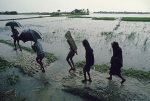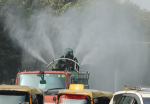Jan 9, 2018
By Dr. S. Saraswathi
(Former Director, ICSSR, New Delhi)
New Delhi: In 26 States/Union Territories in India, some form of plastic ban is imposed, but its implementation is lax. The latest to join the list is Tamil Nadu on 1st January. A global movement against plastic is going on, but only on a slow pace and that too with reluctance requiring penal provisions for violation in marked contrast to its quick adoption when it was introduced. The ban amounts practically to a radical change in lifestyle.
Way back in 2012, two judges of the Supreme Court said that “the next generation will be threatened with something more serious than the atom bomb… unless a total ban on plastic is put in place”.
The word “plastic” is derived from the Greek “plastikos” meaning “capable of being shaped or molded”. It denotes their malleability, or plasticity that allows them to be cast, pressed, or shaped into a variety of forms to manufacture literally thousands of products and parts of products. There are common plastics and also special purpose plastics.
Plastic wastes, major toxic pollutants, are generated in households as well as in public places. Plastic is a non-biodegradable substance containing poisonous chemicals. Its disposal is almost impossible by any means — recycling, burning, or land-filling. Plastic does not undergo bacterial decomposition.
The entire world is facing a crisis in plastic pollution. The EU Parliament approved ban on single-use plastic in October 2018. It is estimated that 18 trillion pounds of plastic waste enters the oceans from coastal regions. June 2018 issue of the National Geographic Magazine was devoted to special coverage on plastics.
The National Oceanic and Atmospheric Administration’s Marine Debris Act in the US fosters efforts to clean up plastic trash from the world’s oceans and encourages federal trade negotiators to prod “leaders of nations responsible for the majority of marine debris to improve management of waste that ends in the ocean”.
It is estimated that India roughly generates 5.6 million tonnes of plastic waste annually and the country accounts for 60 per cent of plastic waste dumped into oceans every year. Three of 10 rivers which carry 90 per cent plastic to world’s oceans are in India – the Indus, Ganges, and Brahmaputra.
Invented in 1870 by an American, John Wesley Hyatt, the first plastic products were made of a material called celluloid that looked like ivory. Known as Bakelite, it was used in household items. Fully synthetic plastic was invented in 1907 in New York, and the name “plastic” was also coined. Many chemists contributed to the research on plastics with the result that its use extended to several fields. Plastic manufacturing became a major part of the chemical industry. Environmental concerns began to rise when it was found that plastic materials would not decompose. This gave rise to vigorous recycling and reuse.
Most of the materials used in the manufacture of plastic are non-renewable fossil fuel-based materials. Through their extraction and production, greenhouse gases are created which contribute to climate change – the biggest threat to our future.
According to the Society of Plastics Engineers, over 200 million tons of plastic are manufactured annually around the world. Of these, 26 million are manufactured in the US. Its Environmental Protection Agency (EPA) has been expressing concern over little progress in recycling of plastic waste as it was mingled with organic wastes like food scraps, wet paper, and liquids, requiring elaborate and expensive cleaning and sanitizing procedures before undertaking recycling.
This situation has not changed in India despite constant instructions and directives for source segregation of wastes. Two decades ago, in 1997 the Delhi Government was urging the public to refrain from using plastic bags to dispose of domestic garbage as it caused immense harm to the cattle. Haryana, Goa, and Himachal Pradesh were first to ban the use of “killer” plastic bags.
A pollutant is a waste material that pollutes air, water, or soil. The severity of pollution is determined by its chemical nature, concentration and persistence. Some pollutants are bio-degradable and will not persist in the environment for long time. It is found that even degradation of some pollutants themselves are polluting.
Plastic pollution involves accumulation of plastic products in the environment that adversely affects wildlife and their habitat as well as humans. Microplastics, mega and macro-plastics – all contribute to plastic pollution. Plastic debris is categorised into primary or secondary – the first found in their original form like bottle caps and cups, and the second is found in the degradation of primary plastics.
Plastic is malleable and can be moulded into solid objects of diverse shapes. The common property of all plastic materials is their ability to undergo irreversible deformation without breaking. Due to their common qualities of “relatively low cost, ease of manufacture, versatility, and imperviousness to water”, plastics are used in a wide range of products from toys to spaceships. These have displaced many traditional materials such as wood, stone, leather, paper, metal, glass, and ceramic even in slow-changing societies. Little thought is bestowed on their nil resale value or the loss in exchanging old metal items with some permanent value to plastic products.
In developed countries, about one-third of plastic use is in packaging. Pipes used in plumbing are made of plastics. Its use is extensive in automobiles, furniture, household goods, and toys. Plastic has a role in building construction.
In India too, packaging is mostly done with plastic materials. Replacement of copper and bronze articles by plastic containers and plates in households has gone on so fast leaving no time to realise the great change that has taken place in the houses of all economic classes.
Plastic has many uses in the medical field. However, the name plastic surgery has come about to denote the quality of plasticity, i.e. pliant required in reshaping flesh and not the use of plastic.
Even a small amount of conventional plastics mixed with organic materials can contaminate and spoil prime quality compost humus. Composters, therefore, do not accept mixed organic waste streams unless they are completely free of non-degradable plastics. A significant waste disposal strategy is thus eliminated by the presence of plastics. On the other hand, certified bio-degradable plastics can completely bio-degrade in a compost facility and thus help recovery of large amount of wastes.
Confusion and disputes over claims of “bio-degradable” plastic prevails in many countries. In the US, California State banned companies from claiming their products as bio-degradable without proper certification from a third party laboratory.
The greatest challenge to the recycling of plastic is the difficulty of sorting of plastic wastes, which is a labour-intensive process unlike metals, which can be mechanically processed. A cell phone, for example, consists of dozens of different types of plastics making sorting the plastics actually a worthless job leading to unusable plastic waste.
However, a lot of progress is made in developed countries whereas countries like India lag far behind. The tragedy is that even today, there are political leaders opposing plastic ban and ready to organise protests as a measure against local manufacturers and small traders. People must wake up to the hazards of the plastic world. Better late than never! —INFA



















